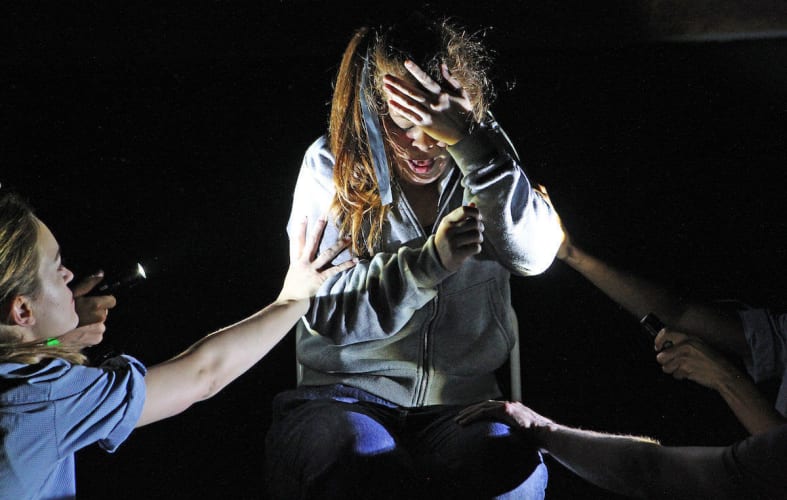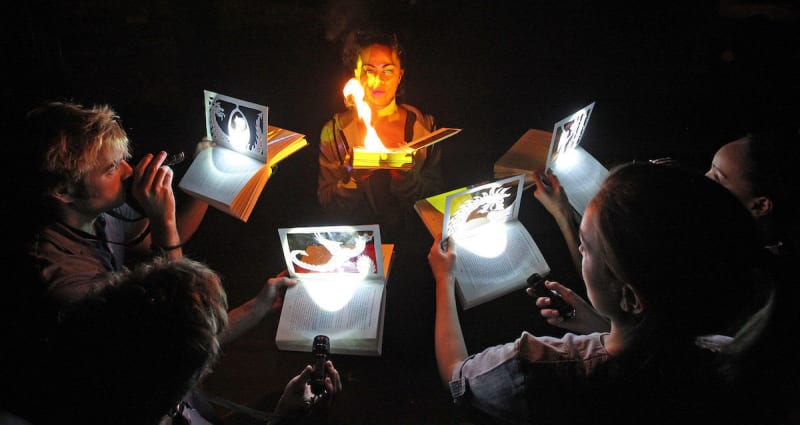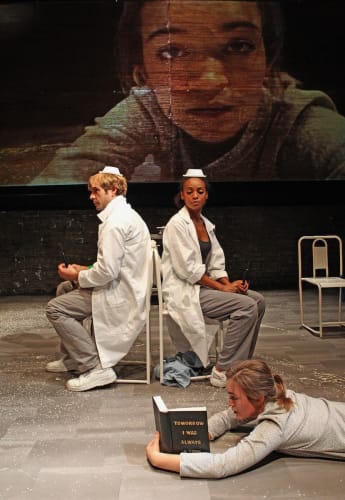Based on a book by a Norwegian author who herself was for ten years diagnosed as a schizophrenic, this is an investigation into the nature of psychosis and recovery and begins a season of plays at the Arcola about mental health.
It is a play that stays very close to Arnhild Lauveng’s memoir. Four actors start the play each reading in turn from her book before pointing their hand-held torches at a figure on the Arcola’s main stage upper level. It is Emily Houghton as Arnhild Lauveng taking over telling her story.
Even at primary school, Arnhild knew something made her different. She was a quiet girl who got bullied. By the time she was 14, she was aware of being both very grown-up and yet very childish. She found herself writing about someone called she, but “she was still me.” She was sad, she was gay.
On the way to work one day, she stopped at a kerb; it became a high precipice and for a long time she couldn’t move. She forced herself onward but it would make her sound mad to say that’s why she arrived late for work.
It was then the The Captain arrived in her head, a belittling, authoritarian figure, telling her what she should do, delivering punishments—though she also knew it was her own hand that was hitting her. She found herself being driven into a strange, dangerous Red Forest. Doctors tried to pull her out of it but once there, there is no going back.
But in this case there was. This is a real-life story not just of schizophrenia but also of recovery.
Arnhild is told to just live with the symptoms but rejects that acceptance. She announces that she wants to be a psychologist and one doctor takes her seriously. She is allowed out into Oslo on the end of a leash, even goes to the cinema.
Each of the actors takes a turn playing Arnhild: Grace Andrews, Oliver Bennett, Samantha Pearl and Alex Robertson as well as Emily Houghton, the others donning white coats to play nurses, doctors and psychiatrists as needed. The books from which they appear to read conceal a video camera and cut-out silhouettes and transparencies that are used to create projected images. As well as having multiple performers, the Arnhild on stage and on screen are continuing reminders of dual personalities.
Director Vladimir Shcherban has devised multiple ways of suggesting the experience of the schizophrenic but the greatest impact comes from Arnhild’s own words and the way these actors present them, undistorted, as though her own voice.
It is a personal story that goes from hallucinations and self-harming through to recovery but it also throws light on medical practice, makes a plea for people to be treated as individuals not as part of a statistic and does so with remarkable directness for the discreet use of sound, careful lighting and theatrical contrivance all serve to concentrate attention on, not distract from, the central experience.
You can’t really replicate what schizophrenia feels like but Tomorrow I was Always a Lion offers hope for a better understanding.
Tomorrow I was Always a Lion will be live streamed direct from London’s Arcola Theatre on moc.media at 7:30PM BST on 22 October. After the Arcola run, there are further performances at The Albany 1 to 12 November 2016.



